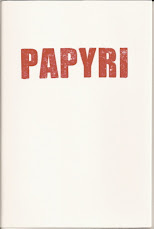 Douglas Adams: Babel-Fish
Douglas Adams: Babel-Fish[The Hitchhiker's Guide to the Galaxy (1981)]
Poetry off the Page
Guest Lecture
(Tuesday, 18 May, 2010)
Opinions on Translation:
Poetry is what gets left out in translation.
– Robert Frost
What is translation? On a platter
A poet’s pale and glaring head,
A parrot’s speech, a monkey’s chatter,
And profanation of the dead.– Vladimir Nabokov
el original es infiel a la traducción
[the original is unfaithful to the translation]
– Jorge Luis Borges
Translation is so far removed from being the sterile equation of two dead languages that of all literary forms it is the one charged with the special mission of watching over the maturing process of the original language and the birth pangs of its own.– Walter Benjamin
Walter Benjamin’s view of the translator [is] one who elicits, who conjures up by virtue of unplanned echo a language nearer to the primal unity of speech than is either the original text or the tongue into which he is translating … this is why, says Benjamin, ‘the question of the translatability of certain works would remain open even if they were untranslatable for man’.– George Steiner
•
 [Fresco in Herculaneum]
[Fresco in Herculaneum]The Masks of Catullus:
Methods of Translation
Odi et amo, quare id faciam, fortasse requiris.
Nescio, sed fieri sentio et excrucior.
– Catullus (c.84-54 BC): Elegy LXXXV
word-for-word crib:
Ōdī ět ămō, quārē ĭd făcĭăm, fŏrtăssě rěquīrĭs.
I detest and I love. Why that I may do, perhaps you ask.
Nĕscĭō sěd fĭěrī sěntĭŏ ět ěxcrŭcĭŏr.
I do not know, but to become I sense and I am tortured.
rhyming couplets:
I hate and love; would’st thou the reason know?
I know not, but I burn, and feel it so.– Richard Lovelace (1618-1657)
I hate and love – ask why – I can’t explain;
I feel ’tis so, and feel it racking pain.– Charles Lamb (1775-1834)
literal version:
I hate and love. Why? You may ask but
It beats me. I feel it done to me, and ache.– Ezra Pound (1885-1972)
aural transcription:
O th’hate I move love. Quarry it fact I am, for that’s so re queries.
Nescience, say th’ fiery scent I owe whets crookeder.– Louis Zukofsky (1904-1978)
There were many words that you could not stand to hear and finally only the names of places had dignity. Certain numbers were the same way and certain dates and these with the names of the places were all you could say and have them mean anything. Abstract words such as glory, honor, courage, or hallow were obscene beside the concrete names of villages, the numbers of roads, the names of rivers, the numbers of regiments and the dates.
- Ernest Hemingway, A Farewell to Arms (1929)
The Exercise:
- You will be given a copy of a poem in a foreign language.
- The text will be accompanied by a literal translation.
- I want you to write me your own poem using these two components.
- It can be a translation (as free, or literal, as you like) of the text you were given.
- Or it can be more obviously your own poem (though it should incorporate some ideas, words, lines or concepts from the original you were given).
- Type the text of your poem into an email and post it to me to be put up on this blog.
•
Authors:








.jpg)
No comments:
Post a Comment